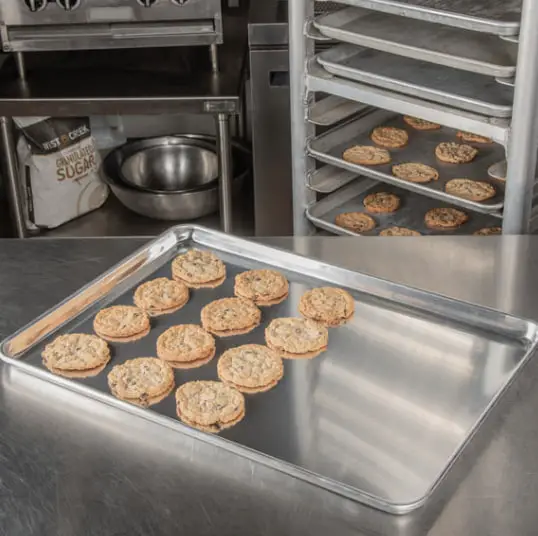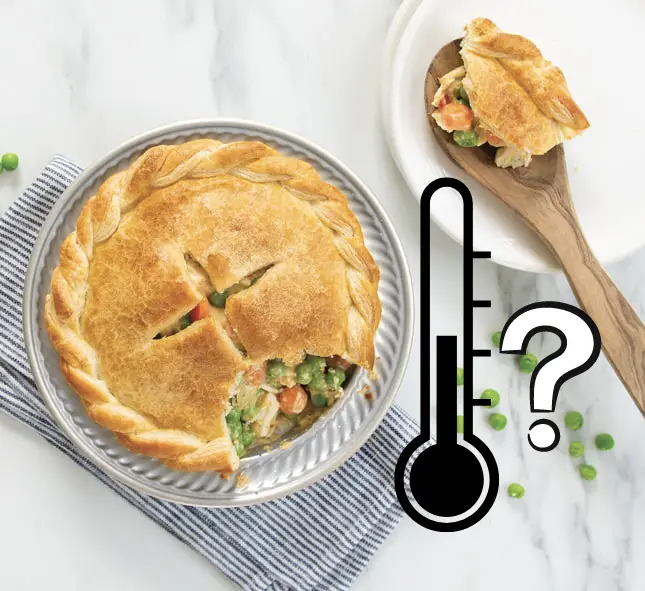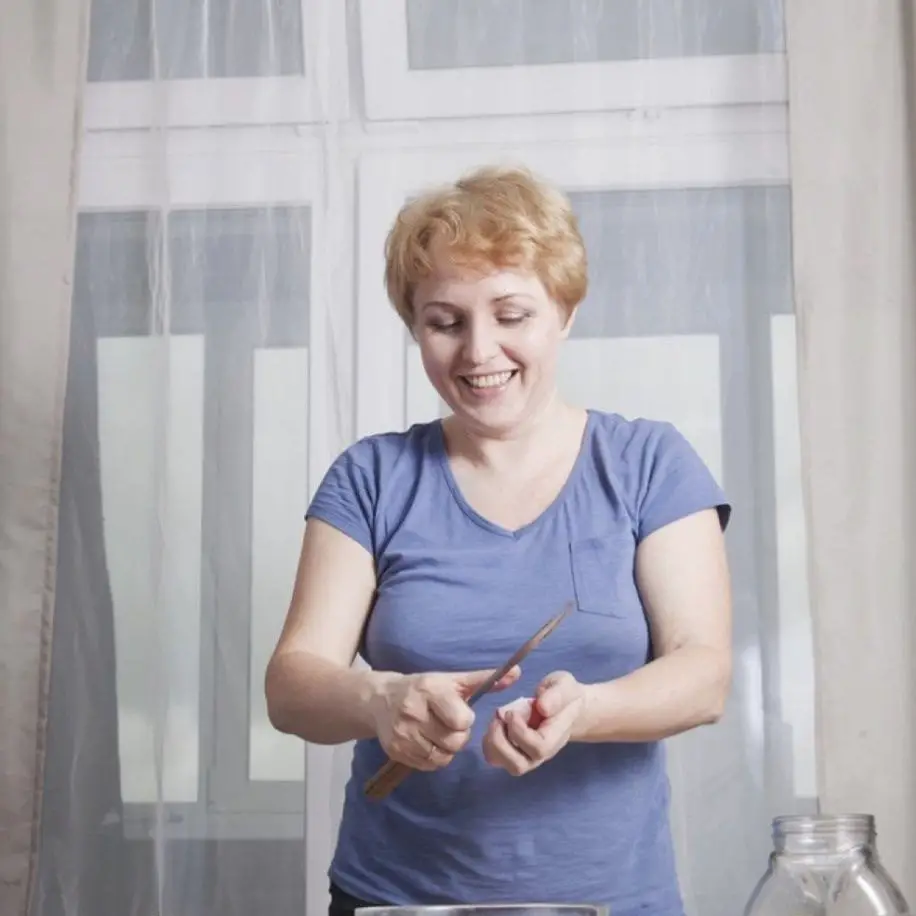Is Aluminum Bakeware safe? Let’s explore! Aluminum bakeware is safe for baking because it can withstand high temperatures ( up to 500 degrees F) without leaching chemicals. The aluminum in bakeware is meager and not harmful to the human body. WHO (World Health Organization) states that adults can consume more than 50 milligrams of aluminum daily without harm. So keep baking and enjoy your food!
So is Aluminum bakeware safe?
Yes, baking with aluminum is generally safe. Aluminum is a common material used in bakeware because it is lightweight, durable, and conducts heat well.
We all know that aluminum reacts with certain acidic foods. So, using a non-reactive baking dish like glass or ceramic is best if you’re baking acidic foods.
Most aluminum bakeware is safe to use at temperatures up to 450-500 degrees Fahrenheit, but it is always a good idea to check the manufacturer’s instructions.
So, aluminum baking is generally safe if you use non-reactive bakeware for acidic or alkaline foods. Make sure to use it at temperatures within the recommended range.

Is anodized aluminum bakeware safe?
Yes, Anodized aluminum bakeware is safe to use for baking. The anodization process creates a non-reactive, non-stick surface that resists corrosion and prevents aluminum from leaching into food.
The maximum baking temperature for anodized aluminum bakeware is typically around 450-500 degrees Fahrenheit (230-260 degrees Celsius).
While anodized aluminum is generally durable and scratch-resistant, avoiding using metal utensils on the surface is recommended to prevent scratching and damaging the non-stick coating. Instead, use silicone, wooden, or plastic utensils.
Anodized aluminum is safe for baking acidic foods like tomatoes or citrus fruits since the surface is non-reactive and won’t interact with the acidic ingredients.
Is cast aluminum bakeware safe?
Cast aluminum bakeware is made by pouring molten aluminum into a mold, allowing it to cool and solidify. This process creates a solid, durable piece of bakeware that can withstand high temperatures and distribute heat evenly.
Cast aluminum bakeware is generally considered safe for baking. It’s important to note that cast aluminum bakeware has no non-stick coating like some other bakeware, so it may require greasing or flouring before use.
What is the safest material to bake with?
When considering the safety of the material for baking, it’s essential to keep in mind the following factors:
- Type of food: Different foods require different baking materials. For example, acidic foods like tomatoes can react with certain metals, while delicate foods like fish may stick to certain materials.
- Baking temperature: Different materials have different temperature limits. Using a material that can’t handle high temperatures can result in melting, warping, or other damage.
- Duration of contract: Some materials can leach chemicals into food over time. If the food will be in contact with the baking material for an extended period, choosing a material that won’t contaminate the food is essential.
With these factors in mind, here are a few materials that are generally considered safe to bake with:
- Ceramic: Ceramic baking dishes are a popular choice because they are non-reactive and won’t interact with acidic or alkaline foods. They also distribute heat evenly, which is important for consistent baking.
- Glass: Like ceramic, glass is non-reactive and distributes heat evenly. However, it can be more fragile than other materials, so it’s essential to handle glass baking dishes carefully.
- Metal: Metal baking pans are durable and can handle high temperatures. However, certain metals, such as aluminum, can react with acidic foods, so choosing a non-reactive metal or using a coating to prevent reactions is essential.
- Silicone: Silicone baking mats and molds have become increasingly popular recently. They are non-stick, flexible, and can handle high temperatures. However, they are relatively new materials, so there is less research on their long-term safety than traditional materials like ceramic and glass.
Is aluminum suitable for bakeware?
Yes, aluminum bakeware is suitable for baking. But Different materials have different benefits when it comes to bakeware. Some people prefer aluminum because it transfers heat well and helps create evenly-baked goods. However, some people find that aluminum can cause issues with sticking and burning. Ultimately, it’s up to the baker to decide what material works best for them and their baking needs.

Is aluminum bakeware toxic?
No, Aluminum bakeware is non-toxic. Most experts agree that aluminum bakeware is safe to use, as the amount of aluminum that is transferred to food is very small.
Is aluminum bakeware dishwasher safe?
Aluminum bakeware is dishwasher safe, but there are some things you should keep in mind when cleaning it. Aluminum is a soft metal so it can scratch easily. If you have aluminum bakeware with a nonstick coating, use a gentle detergent and avoid scrubbing too harshly. You should also avoid using aluminum foil to line the baking sheet, as this can cause the nonstick coating to peel off.
Is an aluminum bakeware broiler safe?
Aluminum bakeware is generally safe in the oven, but it may not be the best choice for broiling.
If you want to use aluminum bakeware for broiling, it’s best to look for products labeled as “broiler safe” or “broiler-proof.”
Alternatively, you may consider using stainless steel, cast iron, or ceramic bakeware for broiling, as these materials are better suited for high heat and won’t react with acidic foods.
Aluminum bakeware temperature limits
Generally, most aluminum bakeware can withstand temperatures of up to 450-500 degrees Fahrenheit (232-260 degrees Celsius). The temperature limits for aluminum bakeware can vary depending on the specific product and its manufacturer.

If you’re unsure about the temperature limits for your specific aluminum bakeware, you can check the manufacturer’s website or packaging for more information or contact the manufacturer directly.
You may also like: The Best Air Fryer For Oven
Conclusion
I hope our article helped you learn more about Aluminum bakeware. If you have any comments or questions, you can leave a comment below. We wish you safe cooking!

I am Linda. A housewife and a writer, and also the founder of this site. I love cooking and collecting cookware sets. I’ve been blogging since 2020, and in this blog, you can find cookware-related problems and solutions, cookware reviews, safe cookware sets, and more.
I have put a lot of effort into gathering here the experience and knowledge that I have, and I want to help every reader.

